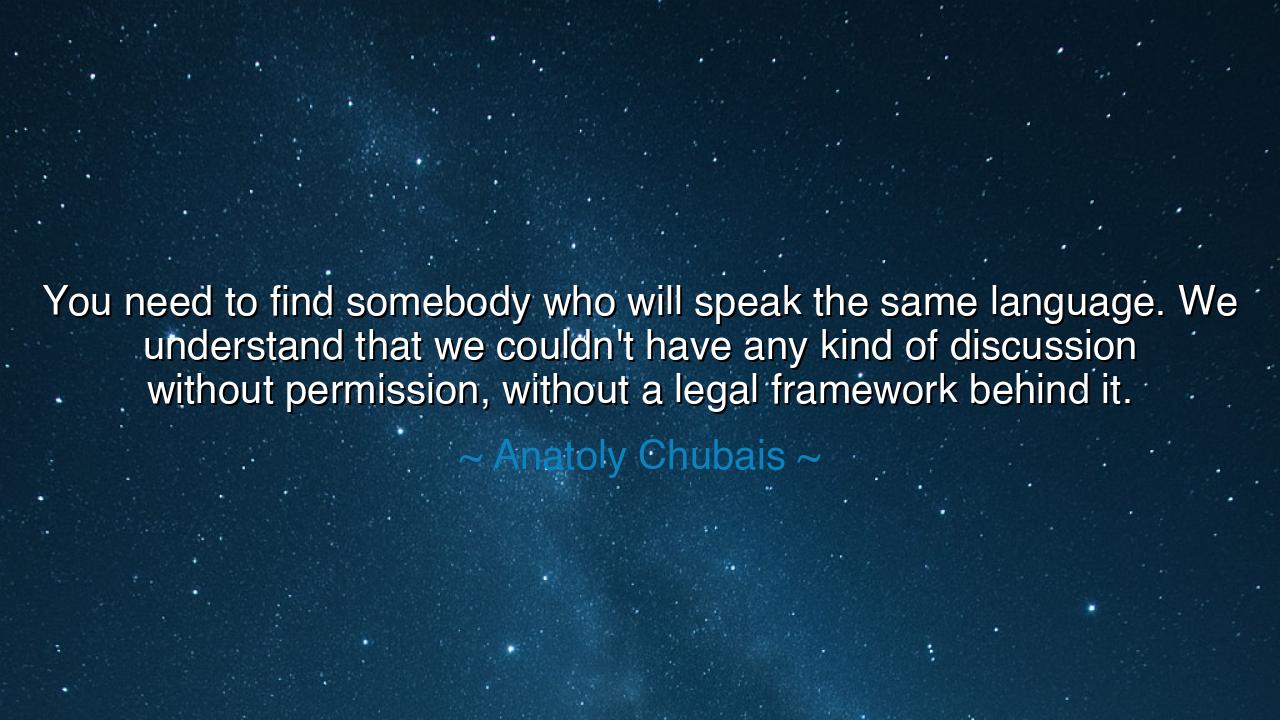
You need to find somebody who will speak the same language. We
You need to find somebody who will speak the same language. We understand that we couldn't have any kind of discussion without permission, without a legal framework behind it.






When Anatoly Chubais said, “You need to find somebody who will speak the same language. We understand that we couldn't have any kind of discussion without permission, without a legal framework behind it,” he spoke as a man who had stood at the intersection of chaos and order, of ambition and structure. His words, though born in the context of diplomacy and governance, reach far beyond politics. They speak to the eternal truth that communication without understanding, and action without law, lead not to creation but to confusion. In his voice we hear the wisdom of one who knows that progress requires both shared purpose and a foundation of trust — that even the mightiest idea must rest upon the firm soil of mutual agreement.
The origin of this quote lies in the turbulent years following the collapse of the Soviet Union, when Chubais, one of Russia’s key reformers, sought to build bridges between East and West, and between old systems and new ones. He was a man negotiating not only with nations, but with history itself. His words reflect the hard lessons of those years — that revolution without law leads to ruin, and dialogue without shared understanding is but noise. In the rebuilding of nations, as in the building of any human bond, there must first be a common language, not of speech alone, but of intention, trust, and principle. Without this, no agreement can hold, and no partnership can endure.
The phrase, “find somebody who will speak the same language,” does not merely mean to find one who shares your words. It means to find one who shares your values, who grasps the meaning behind the words, who listens not just with ears, but with heart. In every age, civilizations have faltered because men shouted across chasms rather than spoke across tables. The Tower of Babel still stands as a symbol of that tragedy — where ambition outstripped understanding, and a common tongue was lost. Chubais reminds us that language — whether diplomatic, cultural, or moral — is the bridge upon which cooperation walks. Without it, even allies become strangers.
But his wisdom extends further. He warns that permission and legal frameworks are not mere formalities, but the sacred architecture of peace. For no discussion, no alliance, no creation can endure without the stability of law. The ancients understood this well. In Rome, even the emperor bowed before the lex, the law, for it was said that “Law is the silent magistrate of the gods.” When men act without legal bounds, chaos follows; when they act within just laws, order flourishes. Chubais, having witnessed the collapse of an empire and the birth of a fragile new order, understood that the absence of law invites both corruption and collapse.
There is a profound humility in his words — the recognition that power must be disciplined by structure, and vision must be tempered by consent. In a world often seduced by passion and speed, Chubais offers a timeless reminder that haste without harmony leads to discord. The true leader, like the wise builder, lays a foundation before raising walls. To “have permission” is not weakness; it is wisdom. It is the understanding that enduring progress is never imposed — it is negotiated, constructed, and sanctified through shared legitimacy.
Consider the example of Cyrus the Great, the Persian ruler who built an empire not by conquest alone, but by understanding the languages and customs of those he ruled. He codified laws that respected local traditions, and his empire endured because it was built not on oppression, but on recognition. He spoke, as Chubais would say, the “same language” as his people — the language of justice, dignity, and structure. Through law, he turned diversity into unity, and his name became synonymous with enlightened leadership.
Let this, then, be the lesson passed to future generations: communication without understanding is emptiness, and cooperation without law is peril. Whether between nations, businesses, or hearts, true dialogue begins only when both sides honor the framework that makes trust possible. The wise do not rush to speak; they first seek to understand. They do not act without permission; they first build legitimacy.
So remember the teaching of Chubais: find the one who speaks your true language — not of words, but of meaning. Build your alliances upon integrity, your actions upon legality, and your dreams upon mutual respect. For only when words are bound by truth, and power guided by law, can peace endure and creation thrive.






AAdministratorAdministrator
Welcome, honored guests. Please leave a comment, we will respond soon